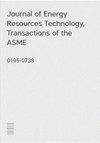Effect of Deflector on the Combustion Characteristics of a Micro-Combustor with a Controlled Centrally Slotted Bluff Body
IF 2.4
3区 工程技术
Q3 ENERGY & FUELS
Journal of Energy Resources Technology-transactions of The Asme
Pub Date : 2023-10-27
DOI:10.1115/1.4063932
引用次数: 0
Abstract
Abstract Flame tip-opening in a micro-combustor with a controlled centrally slotted bluff body adversely affects the combustion characteristics, leading to reduced average combustion efficiency and exhaust gas temperature. To minimize the adverse effects of the flame tip-opening, a deflector is introduced in the micro-combustor, downstream to the bluff body, and its effect on various combustion parameters is studied. The insertion of a deflector significantly increases the exhaust gas temperatures in the central region by establishing a secondary flame root. However, sudden changes in the flow direction caused by the insertion of deflector induce a sudden expansion-compression strain on the flame front, thereby slightly reducing the temperature of the flame zones on either side of the central region. A downstream shift in the position of the deflector marginally mitigates the adverse effects of sudden expansion compression strain on the exhaust gas temperature, as they are induced within the secondary reaction flame zones. On the other hand, the downstream shift of the deflector negatively impacts the exhaust gas temperature in the central region due to the reduced length available for near-complete combustion downstream of the secondary flame root. In conclusion, the deflector positioned farther from the outlet is found to result in better overall combustion characteristics at higher controllable flow ratios.导流板对受控中心开槽钝体微燃烧室燃烧特性的影响
摘要可控中心开缝钝体微燃烧室火焰尖端开度对燃烧特性产生不利影响,导致平均燃烧效率降低,废气温度降低。为了最大限度地减少火焰尖端打开的不利影响,在微燃烧室中引入了一个偏转板,位于钝体下游,并研究了它对各种燃烧参数的影响。导流板的插入通过建立二次火焰根显着提高了中部地区的排气温度。然而,由于导流板的插入导致气流方向的突然变化,在火焰前缘产生了突然的膨胀-压缩应变,从而使中心区域两侧火焰区的温度略有降低。偏转板位置的下游移动略微减轻了突然膨胀压缩应变对废气温度的不利影响,因为它们是在二次反应火焰区域内引起的。另一方面,由于偏转板的下游移动减少了二次火焰根部下游接近完全燃烧的可用长度,因此对中心区域的排气温度产生了负面影响。综上所述,在较高的可控流量比下,偏转板位置离出口越远,整体燃烧特性越好。
本文章由计算机程序翻译,如有差异,请以英文原文为准。
求助全文
约1分钟内获得全文
求助全文
来源期刊
CiteScore
6.40
自引率
30.00%
发文量
213
审稿时长
4.5 months
期刊介绍:
Specific areas of importance including, but not limited to: Fundamentals of thermodynamics such as energy, entropy and exergy, laws of thermodynamics; Thermoeconomics; Alternative and renewable energy sources; Internal combustion engines; (Geo) thermal energy storage and conversion systems; Fundamental combustion of fuels; Energy resource recovery from biomass and solid wastes; Carbon capture; Land and offshore wells drilling; Production and reservoir engineering;, Economics of energy resource exploitation

 求助内容:
求助内容: 应助结果提醒方式:
应助结果提醒方式:


